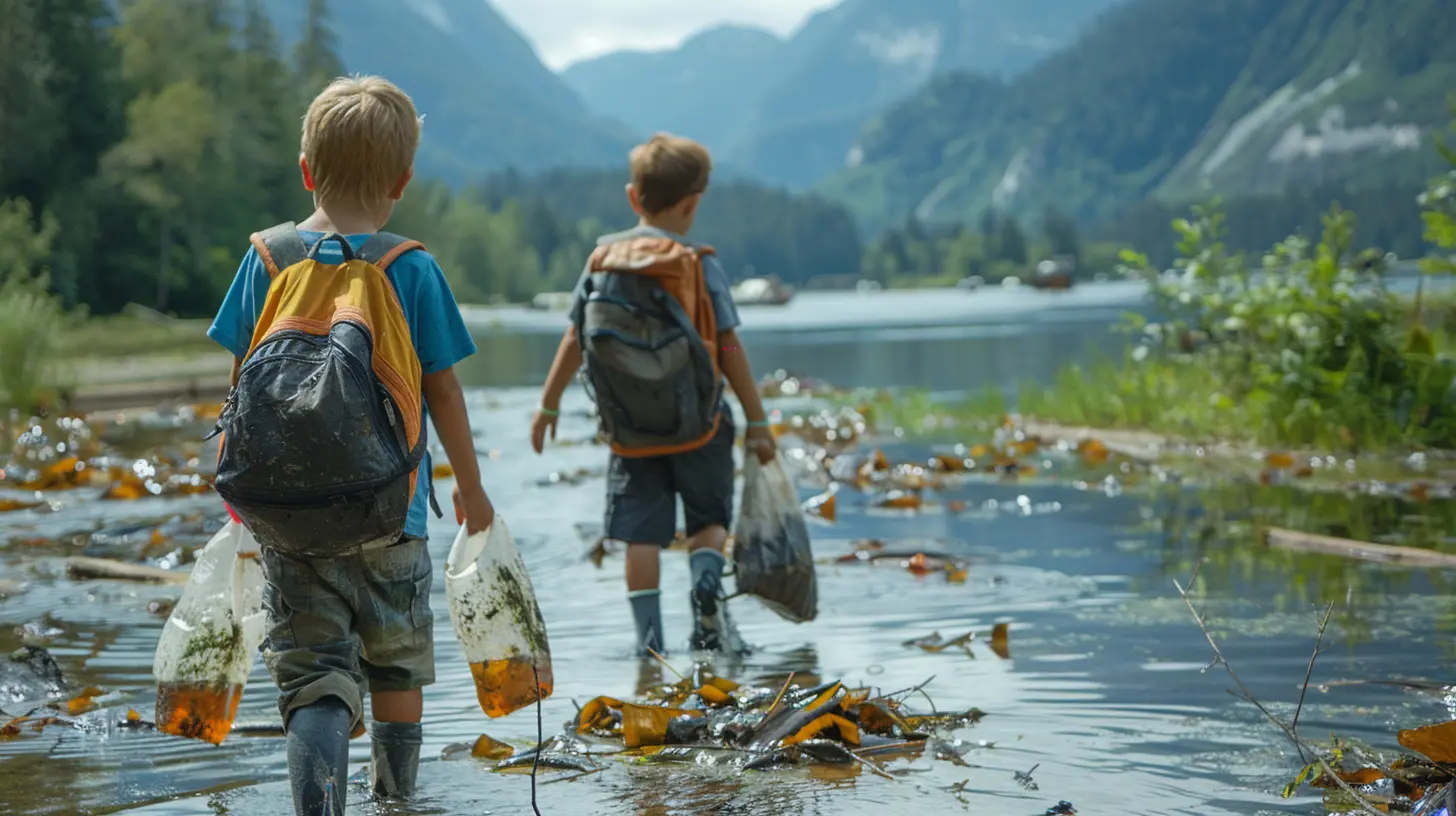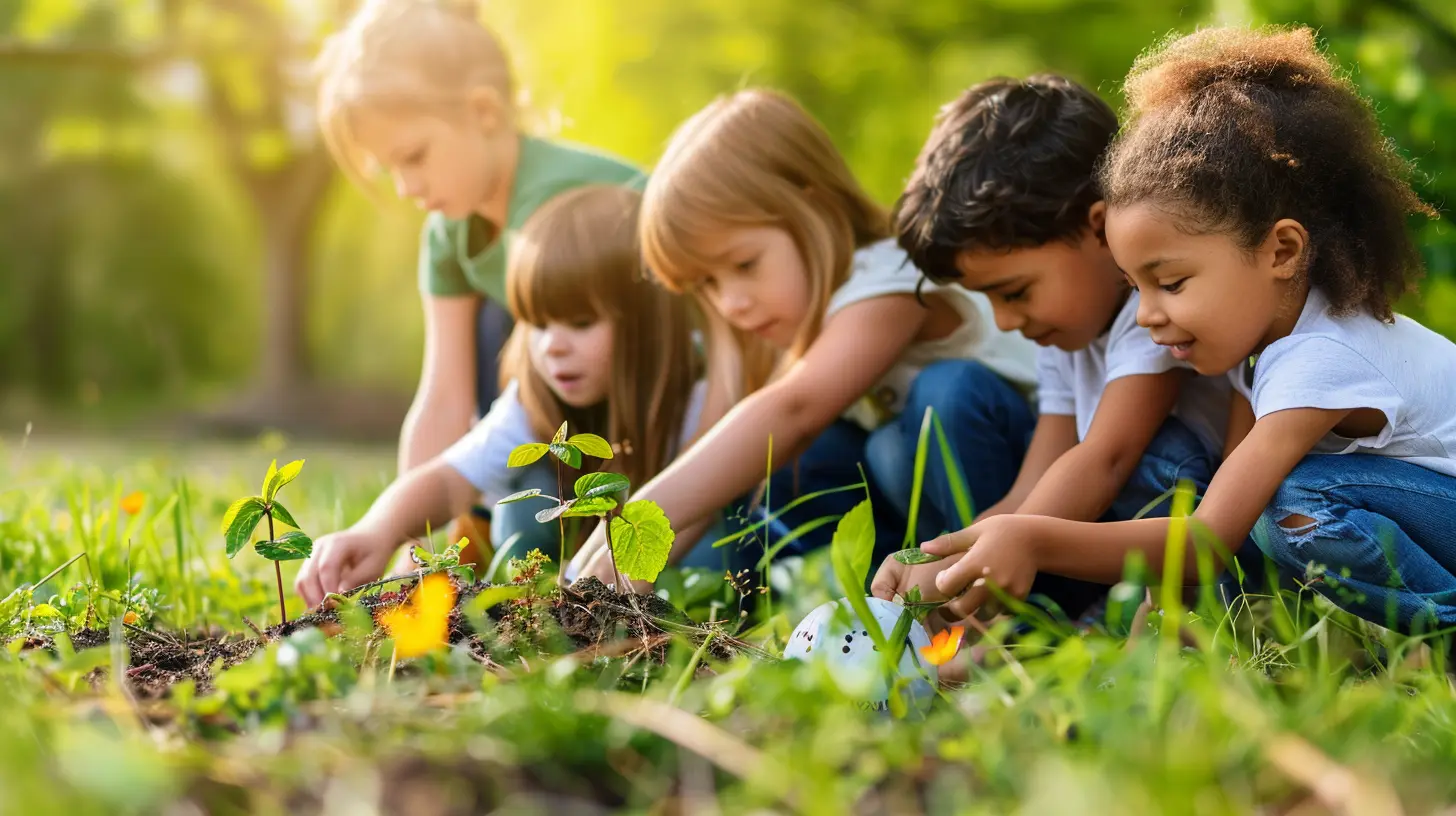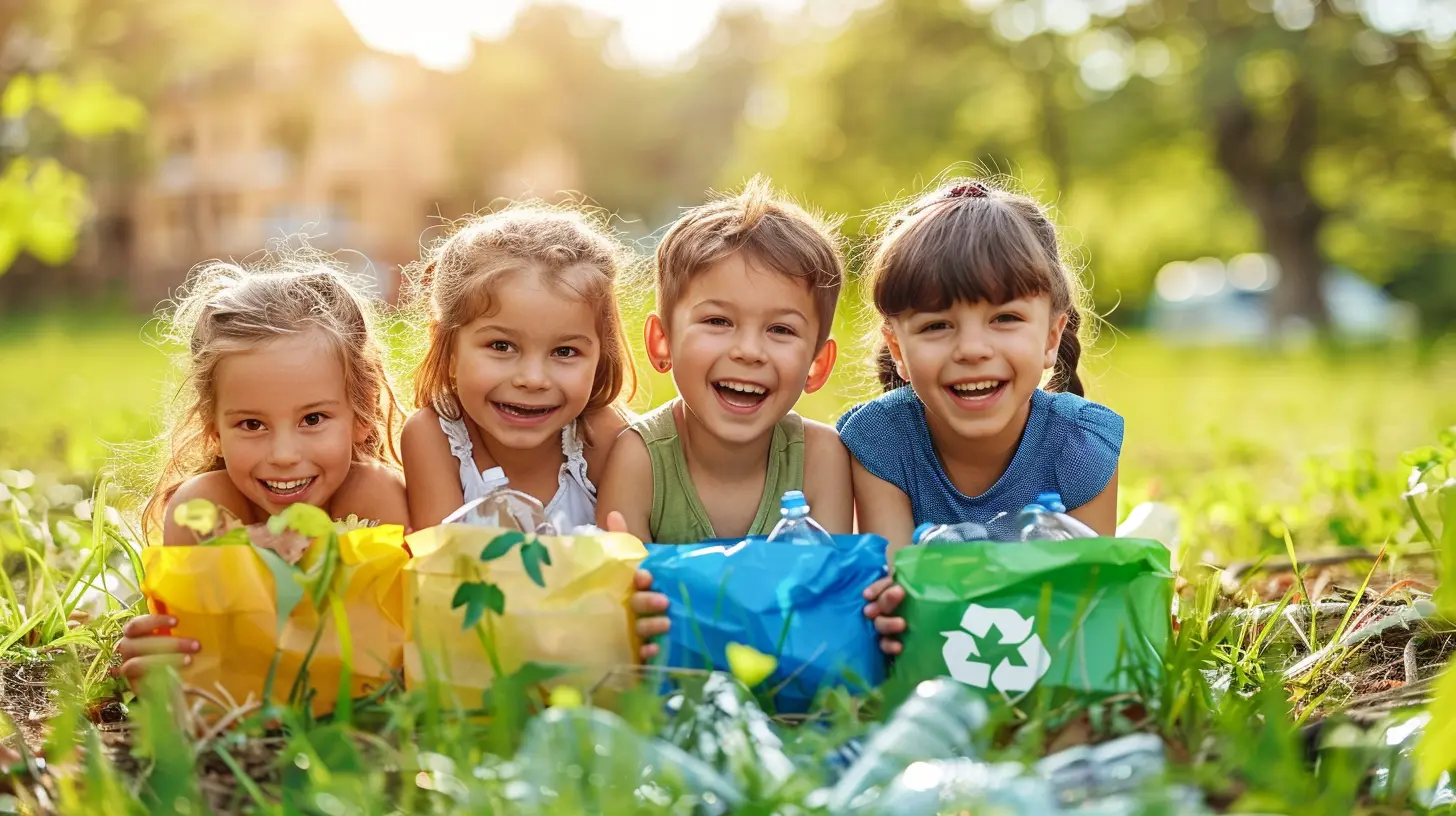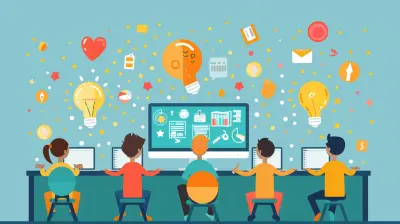Empowering Students to Take Action on Environmental Issues
13 December 2024
The world is facing enormous environmental challenges—climate change, deforestation, pollution, and biodiversity loss, just to name a few. For many of us, these issues can feel overwhelming, and it's easy to think, "What can I possibly do?" But here's the thing: change doesn’t have to come from world leaders or massive organizations alone. Every single one of us, including students, can make a significant difference.
In fact, students are in a prime position to be the change-makers, the disruptors, and the innovators when it comes to tackling environmental issues. But how do we empower them to take action? How do we inspire the next generation to not just understand these problems, but to actively work on solving them?
In this article, we’ll dive into why empowering students to take action on environmental issues is crucial, and how educators, parents, and communities can play a vital role in sparking this movement.

Why Students? The Power of Young Minds
Let’s be real—students are the future. They are the ones who will inherit this planet, and they are the ones who will have to deal with the long-term impacts of environmental degradation. But beyond just being future leaders, students have a unique superpower. Their minds are still open, curious, and adaptable. They can think outside the box, question the status quo, and push boundaries in ways that adults often struggle to do.Think about it. When was the last time a child asked you “Why?” five times in a row? It’s that curiosity and relentless questioning that can lead to innovative solutions. Students are not bound by the limitations of “how things are done”—they are more interested in “how things could be done.”
Students as Catalysts for Change
Young people have always been at the forefront of social movements. From civil rights to gender equality, students have historically played a massive role in pushing for change. Why would environmental issues be any different?Take Greta Thunberg, for example. She started with a single act—a school strike for climate—and has since inspired millions of people globally. Her message is clear: you don’t have to wait for permission to make a difference. You can start right where you are.
But it’s not just about inspiring the next Greta Thunberg. Every student has the potential to contribute in their own unique way, whether it’s through activism, science, or simply making more sustainable choices in their everyday lives.

How Can We Empower Students to Take Action on Environmental Issues?
Now that we understand why students are so important, the next question is: how do we actually empower them? It’s not enough to just tell them about environmental problems. We need to give them the tools, the confidence, and the opportunities to take action.Here are some practical ways educators, parents, and communities can empower students:
1. Education That Goes Beyond the Classroom
It all starts with knowledge. But here’s the kicker—students don’t just need to know about the problems. They need to understand the solutions. Traditional environmental education often focuses on doom and gloom: melting ice caps, endangered species, rising sea levels. While it’s important to understand the severity of the issues, focusing solely on the negative can lead to eco-anxiety, where students feel powerless and overwhelmed.Instead, shift the focus to solutions-based learning. Teach students about renewable energy, sustainable agriculture, conservation efforts, and innovative technologies like carbon capture. Show them real-world examples of communities and individuals making a difference.
One effective way to do this is through project-based learning, where students can work on real environmental problems in their local area. Whether it’s organizing a recycling campaign or conducting a water quality test in a nearby river, hands-on projects give students the chance to apply what they’ve learned in a meaningful way.
2. Foster Critical Thinking and Problem-Solving Skills
Why is this important? Because environmental issues are complex. They often involve trade-offs, competing interests, and difficult decisions. To solve these problems, students need to be able to think critically and creatively. They need to be able to analyze data, evaluate different perspectives, and come up with innovative solutions.Encourage students to ask questions like:
- What are the root causes of this problem?
- Who is most affected, and why?
- What are the potential unintended consequences of this solution?
This kind of critical thinking empowers students to not just accept things at face value but to dig deeper and understand the complexities of environmental issues.
3. Provide Opportunities for Leadership and Advocacy
Students need to know that their voices matter. One way to empower them is by providing opportunities for leadership and advocacy. Schools can create environmental clubs where students take the lead on sustainability initiatives. These clubs can work on projects such as reducing plastic waste, starting a school garden, or organizing an Earth Day event.Additionally, students can be encouraged to participate in larger movements, such as global climate strikes or local environmental advocacy efforts. Writing petitions, speaking at town hall meetings, or even starting a blog on environmental issues are all ways students can make their voices heard.
By giving students these leadership opportunities, they learn that they don’t have to wait for someone else to fix the problem. They can be the ones driving change.
4. Encourage Sustainable Habits in Everyday Life
While large-scale activism is important, change also starts with individual actions. Empower students to adopt sustainable habits in their daily lives. Small actions, when multiplied by many people, can lead to big changes.Encourage students to:
- Reduce their energy consumption by turning off lights and unplugging electronics.
- Use reusable water bottles and lunch containers instead of single-use plastics.
- Walk, bike, or carpool to school to reduce their carbon footprint.
- Start composting food waste at home or at school.
- Participate in community clean-up days.
These actions may seem small, but they add up over time and help create a culture of sustainability.
5. Support Emotional Resilience and Hope
Let’s not sugarcoat it—environmental issues can be depressing. It’s easy to feel like the world is falling apart. That’s why it’s so important to support students emotionally as they engage with these issues.Teach students about the concept of eco-resilience, which is the ability to stay hopeful and motivated in the face of environmental challenges. Encourage them to celebrate small wins and progress, rather than focusing solely on the enormity of the problems.
Let them know it’s okay to feel frustrated or sad, but that these emotions can also fuel action. When students understand that they can make a difference—even if it’s just a small one—they are more likely to stay engaged and motivated over the long term.
6. Connect Students with Role Models and Mentors
Sometimes, students need to see someone else doing it to believe that they can do it too. Connecting students with environmental role models, either in person or virtually, can be incredibly empowering.These role models don’t have to be famous activists—they can be local community leaders, scientists, or even older students who are already working on environmental projects. By hearing their stories and learning about their journeys, students can gain inspiration and practical advice for taking action themselves.

The Role of Technology in Empowering Students for Environmental Action
In today’s digital age, technology can be a powerful tool for environmental education and activism. From social media platforms to online learning resources, students have access to a wealth of information and tools that can help them make a difference.1. Leverage Social Media for Awareness and Advocacy
Social media has revolutionized the way we communicate, and students are already highly engaged on these platforms. Why not use them for good?Encourage students to use their social media accounts to raise awareness about environmental issues. They can share articles, create videos, and even start online campaigns to advocate for change. By using hashtags and tagging relevant organizations, students can amplify their message and reach a larger audience.
2. Use Apps and Tools for Environmental Impact Tracking
There are also a variety of apps and digital tools that allow students to track their environmental impact. For example, apps like JouleBug or Oroeco help users track their energy usage, water consumption, and carbon footprint. By using these tools, students can see the real-world impact of their actions and find ways to improve.3. Virtual Learning and Citizen Science
The internet is full of virtual learning opportunities, from MOOCs (Massive Open Online Courses) on environmental science to virtual field trips to national parks. Students can also participate in citizen science projects, where they can contribute to real scientific research by collecting data on wildlife, air quality, or other environmental factors in their communities.
Conclusion: Every Action Counts
Empowering students to take action on environmental issues isn’t just about saving the planet—it’s about giving them the tools and confidence to be leaders in their communities and in their future careers. Whether it’s through education, leadership opportunities, or simply encouraging sustainable habits, we all have a role to play in helping the next generation take charge.Remember, every action—no matter how small—makes a difference. And when students realize that they have the power to create change, there’s no limit to what they can achieve. So let’s inspire them, support them, and watch as they lead us toward a more sustainable future.
all images in this post were generated using AI tools
Category:
Environmental EducationAuthor:

Bethany Hudson
Discussion
rate this article
16 comments
Colin Elliott
Empowerment sparks change; action follows awareness.
March 28, 2025 at 4:59 AM

Bethany Hudson
Absolutely! Empowering students through awareness is the crucial first step in driving meaningful environmental action.
Faryn Kane
Empowering students fosters critical thinking and activism, essential for addressing urgent environmental challenges today.
February 9, 2025 at 12:15 PM

Bethany Hudson
Absolutely! Empowering students not only nurtures their critical thinking skills but also equips them to become proactive change-makers in tackling pressing environmental issues.
Amelia Reynolds
This article brilliantly emphasizes the importance of empowering students to tackle environmental issues. Engaging them in active problem-solving not only fosters responsibility but also cultivates a generation of informed and passionate environmental advocates.
January 31, 2025 at 11:55 AM

Bethany Hudson
Thank you for your insightful comment! I'm glad the article resonated with you and highlighted the crucial role of student engagement in environmental advocacy.
Theo McCabe
Sure, because what could be more fun than tackling climate change? Who wouldn’t want to swap their weekend Netflix binge for saving the planet?
January 28, 2025 at 4:52 AM

Bethany Hudson
Tackling climate change may not seem like a weekend thrill, but empowering students to take action can transform their passion into impactful solutions for our planet's future!
Jude Hudson
This article highlights the importance of empowering students in environmental advocacy. By fostering their voices and actions, we cultivate a generation committed to sustainable change. Inspiring read!
January 25, 2025 at 1:46 PM

Bethany Hudson
Thank you for your thoughtful comment! I'm glad you found the article inspiring and agree on the importance of empowering students for a sustainable future.
Jacqueline Lane
Great article! It's inspiring to see how empowering students can spark meaningful change for our planet. Encouraging them to take action on environmental issues not only fosters responsibility but also cultivates future leaders dedicated to sustainability. Keep up the amazing work!
January 17, 2025 at 7:19 PM

Bethany Hudson
Thank you for your kind words! I'm glad you found the article inspiring and agree on the importance of empowering students for a sustainable future.
Delilah Sawyer
This article beautifully highlights the crucial role students play in addressing environmental challenges! Empowering young minds to take action not only fosters responsibility but also inspires innovation. Let’s encourage our future leaders to advocate for change and protect our planet—every small effort counts! 🌍✨
January 13, 2025 at 5:08 AM

Bethany Hudson
Thank you for your thoughtful insights! Empowering students is indeed key to fostering innovation and responsibility in tackling environmental challenges. Together, we can inspire meaningful change! 🌍✨
Christa Young
What a fantastic article! It's inspiring to see how empowering students can lead to meaningful change in our environment. Encouraging young minds to take action not only fosters responsibility but also sparks creativity and hope for a greener future. Together, we can make a difference! 🌍💚
January 5, 2025 at 4:05 AM

Bethany Hudson
Thank you for your kind words! I'm glad the article resonated with you and highlights the vital role students play in creating a sustainable future. Together, we truly can make a difference! 🌍💚
Solstice Duke
This article highlights the crucial role of education in fostering environmental stewardship. By empowering students with knowledge and action-oriented skills, we not only cultivate informed citizens but also inspire a generation to tackle pressing ecological challenges with innovative solutions and collective responsibility.
January 2, 2025 at 12:53 PM

Bethany Hudson
Thank you for highlighting the importance of education in promoting environmental stewardship! Empowering students is key to inspiring innovative solutions for our ecological challenges.
Owyn Barlow
This article brilliantly emphasizes the importance of student empowerment in addressing environmental challenges. Encouraging hands-on activities, such as community clean-ups and sustainability projects, can enhance students' connection to their environment. Additionally, fostering critical thinking and collaboration among peers will equip them with the skills needed to drive impactful change. Great insights!
December 27, 2024 at 5:24 AM

Bethany Hudson
Thank you for your thoughtful comment! I'm glad you found the emphasis on hands-on activities and collaboration valuable—these are key to fostering empowered and engaged students.
Soraya Wagner
Empowering students to engage with environmental issues fosters critical thinking and responsibility. By cultivating their voices and actions, we inspire future leaders to tackle global challenges and promote sustainable change.
December 16, 2024 at 7:31 PM

Bethany Hudson
Thank you for your insightful comment! Empowering students is indeed crucial for nurturing critical thinkers and future leaders in sustainability. Together, we can inspire meaningful change.
Esme Larsen
Let’s turn eco-anxiety into eco-action—because saving the planet should come with a side of fun!
December 16, 2024 at 5:25 AM

Bethany Hudson
Absolutely! Turning eco-anxiety into eco-action not only empowers students but also makes the journey enjoyable and engaging. Let's get creative and make sustainability exciting! 🌍✨
Lila Fletcher
Great insights! Empowering students is key to fostering environmental stewardship.
December 15, 2024 at 3:41 AM

Bethany Hudson
Thank you! Empowering students is indeed crucial for inspiring meaningful environmental action.
Jillian Morales
Because saving the planet shouldn't be an option—let's get to work!
December 14, 2024 at 4:58 AM

Bethany Hudson
Absolutely! Every effort counts, and empowering students is vital for creating a sustainable future. Let's inspire action together!
Colin Hill
Every small action counts! Empowering students to tackle environmental issues fosters creativity and leadership. Together, we can create a brighter, sustainable future—let's inspire the change we wish to see!
December 13, 2024 at 8:16 PM

Bethany Hudson
Absolutely! Every small action indeed makes a difference, and empowering students is key to fostering innovative solutions for a sustainable future. Let's keep inspiring change together!
Samira Good
Empowering students sparks a brighter, greener future!
December 13, 2024 at 3:47 AM

Bethany Hudson
Absolutely! Empowering students is crucial for fostering innovative solutions and inspiring change for a sustainable future.
MORE POSTS

How to Help Students with Learning Disabilities Thrive in Remote Learning

The Science of Flight: How to Build and Test Paper Airplanes

The Importance of Logical Reasoning in Math Problem Solving

The Importance of English Collocations and How to Learn Them

How to Handle Disruptive Behavior Without Losing Your Cool

Mastering English Pronunciation: Tips for Non-Native Speakers

The Intersection of Collaboration and Innovation in Education

Leveraging Technology to Boost Your Learning and Development

The Benefits of Blended Learning for Diverse Learners

The Power of Reading: How Reading Can Transform Your English